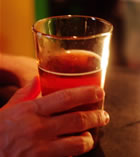The effect of alcohol on blood glucose levels depends not only on the amount of alcohol ingested, but also on its relationship to food intake.
The same precautions that apply to alcohol comsumption for the general population apply to persons with diabetes. However, in persons in the fasting state taking exogenous insulin, alcohol may produce hypoglycemia.
Alcohol cannot be converted to glucose (it can be used as a source of calories and is metabolized in a manner similar to fat), and it blocks gluconeogenesis.
It also augments or increases the effects of insulin by interfering with the counterregulation response to insulin-induced hypoglycemia.
For most individuals, blood glucose levels are not affected by moderate use of alcohol when diabetes is well controlled.
Content Continues Below ⤵ ↷
For persons using insulin, up to 2 drinks (1 drink = 12 oz. beer, 5 oz wine, 1-1/2 oz of distilled spirits) of an alchoholic beverage can be consumed with, and in addition to, the regular meal plan.
No food should be omitted because of the possibility of alcohol-induced hypoglycemia, because alcohol does not require insulin to be metabolized.
Persons whose blood glucose is out of control, those with elevated triglycerides, and pregnant women should avoid alcohol.
For people concerned with total energy intake, alcohol is best substituted for fat exchanges or calories. Alcohol is high in calories (7 kcal/g) and is metablolized in a manner similar to fat.
